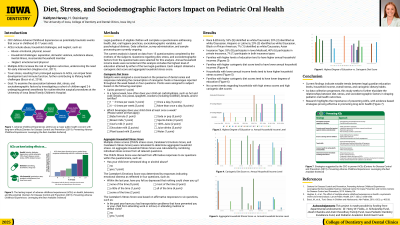Preventive
301 - Diet, Stress, and Sociodemographic Factors Impact on Pediatric Oral Health

- KH
Kaitlynn Harvey, DDS (she/her/hers)
Pediatric Dentistry Resident
University of Iowa, Iowa City, IA
University of Iowa
Iowa City, Iowa, United States - HS
Heidi Steinkamp, DDS PhD MS
University of Iowa College of Dentistry
Iowa City, Iowa, United States
Presenting Author(s)
Program Director(s)
Objective: Adverse Childhood Experiences (ACEs) are potentially traumatic events that can
disrupt a child’s neurodevelopment and trigger toxic stress. Prolonged activation of the stress-
response system has been associated with various physical, emotional, and behavioral health
challenges across the lifespan. ACEs encompass experiences such as abuse, neglect, household
challenges, food insecurity, and other forms of instability. Research indicates that parents
experiencing financial hardship are more prone to stress, depression, and family conflict—
factors that significantly heighten the risk of ACE exposure. There is strong evidence linking low
socioeconomic status to ACEs and subsequent long-term health, educational, and social
outcomes for children.
Methods: This study seeks to examine the association between diet, stress, and
sociodemographic factors by investigating a cohort of children aged 2-6 undergoing general
anesthesia for routine elective surgical procedures at the University of Iowa Stead Family
Children’s Hospital. Legal guardians of eligible children will complete a questionnaire
addressing health, diet, oral hygiene practices, sociodemographic variables, and psychological
distress.
Conclusion: This study aims to deepen our understanding of how diet, stress, and
sociodemographic factors influence the oral health of young children undergoing general
anesthesia for minor surgical procedures. By examining children from diverse backgrounds, the
research will assess how factors such as socioeconomic status, parental stress, and dietary habits
contribute to oral health outcomes. The findings are expected to highlight the critical role of
early-life experiences and environmental influences in shaping oral health, underscoring the
importance of addressing these factors in pediatric care. Ultimately, the study may inform
strategies for improving oral health in at-risk populations, promoting healthier outcomes through
targeted interventions and support for families facing socioeconomic or psychological
challenges. Data collection, survey administration, and sample processing are currently ongoing.
Identify Supporting Agency and Grant Number:

.jpg)